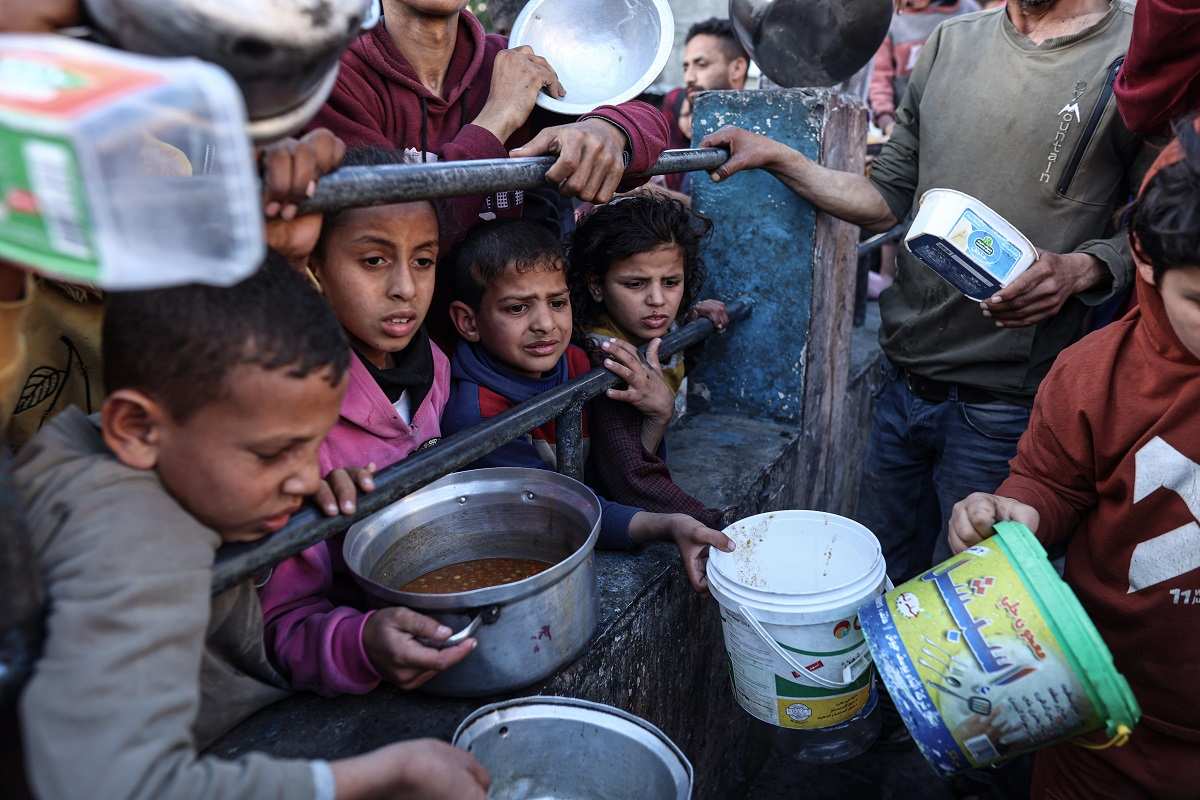
Displaced Palestinians in Rafah gather in March to collect donated food.
16:51 JST, May 21, 2024
In a stunning announcement that drew sharp indignation from both warring parties, the International Criminal Court’s chief prosecutor said Monday that he was seeking to charge senior figures in the Israel-Gaza conflict, including Israeli Prime Minister Benjamin Netanyahu and Hamas leader Yehiya Sinwar, with war crimes and crimes against humanity.
Karim Khan’s statement listed extensive charges and sought additional arrest warrants for Israeli Defense Minister Yoav Gallant and two other top Hamas leaders – Mohammed Diab Ibrahim al-Masri, the leader of the Izzedine al-Qassam Brigades better known as Mohammed Deif, and Ismail Haniyeh, Hamas’s political leader.
The ICC is the only permanent international court that wields power to prosecute individuals for genocide, crimes against humanity and war crimes. Its announcement Monday was historic: Although Israel is not a signatory to the Rome Statute, upon which the court is founded, the arrest warrants, if issued, would nonetheless stigmatize the country’s senior leaders.
The ICC’s pre-trial chamber will now consider Khan’s application. If it approves the request, international arrest warrants would be issued for the five men and would be enforced by the court’s 124 member states.
The timeline for a decision remained unclear Monday: Historically, the court has taken several months to decide whether warrants should be issued.
Current figures with outstanding ICC arrest warrants include Russian President Vladimir Putin, for the crime of unlawful deportation and population transfer from occupied areas of Ukraine to Russia, and the deposed president of Sudan, Omar Hassan al-Bashir, for crimes against humanity and genocide.
President Biden described the warrant applications as “outrageous.”
“Let me be clear: Whatever this prosecutor might imply, there is no equivalence – none – between Israel and Hamas,” he said in a statement.
Netanyahu also described the ICC announcement as “outrageous,” and Israeli Foreign Minister Israel Katz said he has ordered the immediate establishment of a government “command center” to fight the prosecutor’s move. Hamas said the statement equated “the victim with the executioner” and demanded that the request for arrest warrants against its leaders be canceled.
But Khan’s request Monday emphasized that his office believes that international law and the laws of armed conflict “apply to all.”
“No foot soldier, no commander, no civilian leader – no one – can act with impunity,” he said. “If we do not demonstrate our willingness to apply the law equally, if it is seen as being applied selectively, we will be creating the conditions for its collapse.”
The conflict began Oct. 7 when Hamas militants killed some 1,200 people in southern Israel and kidnapped around 250 more. Israel’s retaliatory military campaign has killed more than 35,000 Palestinians, wounded almost 80,000 and leveled swaths of the enclave as aid shortages push the population to the brink of starvation.
Khan said his office had reasonable grounds to believe that Netanyahu and Gallant were responsible for crimes including starvation of civilians as a method of warfare, willful killing and murder, intentionally directing attacks against a civilian population, and extermination.
These occurred, he said, after the imposition of a “total siege” of Gaza that involved “completely closing the three border crossing points, from 8 October 2023 for extended periods, and later, by arbitrarily restricting the transfer of essential supplies.”
The statement also highlighted attacks on civilians, including those lining up for food, obstruction of aid delivery by humanitarian agencies, and attacks on aid workers, which forced many agencies to cease or limit their operations. Almost 200 United Nations workers have been killed in Gaza since the conflict began.
“Israel, like all States, has a right to take action to defend its population. That right, however, does not absolve Israel or any State of its obligation to comply with international humanitarian law,” Khan said in his statement.
“Notwithstanding any military goals they may have, the means Israel chose to achieve them in Gaza – namely, intentionally causing death, starvation, great suffering, and serious injury to body or health of the civilian population – are criminal,” he said.
In the case of Hamas leaders Sinwar, Deif and Haniyeh, the prosecutor said his office had reasonable grounds to believe that the men were criminally liable for extermination as a crime against humanity, taking hostages, and torture, rape and other acts of sexual violence in the context of captivity.
“It is the view of my Office that these individuals planned and instigated the commission of crimes on 7 October 2023, and have through their own actions, including personal visits to hostages shortly after their kidnapping, acknowledged their responsibility for those crimes,” Khan said.
“My Office also submits there are reasonable grounds to believe that hostages taken from Israel have been kept in inhumane conditions, and that some have been subject to sexual violence, including rape, while being held in captivity,” he added.
Kevin Jon Heller, a special adviser to Khan and a law professor at University of Copenhagen’s Centre for Military Studies, said the prosecutor brought charges for which he believed he had a “reasonable prospect of conviction.”
In a separate report published Monday, an independent panel of legal experts convened by the prosecutor said they agreed with Khan’s findings. “We have carefully examined each of the applications for arrest warrants, as well as underlying material produced by the prosecution team in support of the applications,” the group wrote, in an accompanying article in the Financial Times. “We unanimously agree that there are reasonable grounds to believe that the suspects he identifies have committed war crimes and crimes against humanity within the jurisdiction of the ICC.”
In applying for the arrest warrants, Khan said that his office was using its jurisdiction in the Palestinian territories and that the scope of this jurisdiction extended to Gaza and the West Bank, including East Jerusalem.
The Palestinian Authority became a member of the ICC in 2015, prompting Israeli officials to urge allies to stop funding the court. Although neither Israel nor the United States is a member state of the ICC, if warrants are issued, Israeli officials would face the risk of arrest in signatory countries.
Secretary of State Antony Blinken said Monday that the United States disagreed with the prosecutor’s assessment that it had jurisdiction over the case. “The ICC was established by its state parties as a court of limited jurisdiction. Those limits are rooted in principle of complementarity, which do not appear to have been applied here amid the prosecutor’s rush to seek these arrest warrants,” Blinken said.
Other legal experts disagreed. “The ICC must brace itself for the flurry of attacks that will come its way – from Israel and its Western allies,” said Oumar Ba, an assistant professor of government at Cornell University. “U.S. State Secretary Blinken has stated today that ‘the ICC has no jurisdiction over this matter.’ That is not true.”
Heller said the accused parties had the right to challenge the prosecutor’s announcement if they disagree with the jurisdiction invoked or on the basis of the complementarity principle, which gives states priority over the ICC in investigating and prosecuting alleged serious crimes.
To meet that test, Heller said, Israel would have to show that it was actively investigating Netanyahu and Gallant for the behavior outlined in Khan’s charge sheet.
Legal scholars described the prosecutor’s announcement as an important milestone in the Israel-Gaza conflict.
“It’s a really serious inflection point for Western states that have been totally unwilling, with respect to their domestic audience or foreign policy, to do or say anything that is critical of Israeli practice or policy in Gaza,” said Heidi Matthews, an assistant professor at York University’s Osgoode Hall Law School. “This really puts a mirror up to those states, most of which are state parties to the ICC, and have been very vocal in supporting the court’s activities with respect to other states, namely Russia.”
Adil Haque, a professor of law at New Jersey’s Rutgers University, described the significance as “tremendous.”
“The decision to charge not only war crimes but also crimes against humanity is notable because then you’re not only looking at specific incidents or specific decisions, but you’re alleging that there is a policy and a widespread or systematic attack against the civilian population,” he said.
News that Khan was considering action against Israeli officials leaked in late April, sparking intense pressure on the prosecutor to reconsider. His office released a statement in early May denouncing attempts to “threaten to retaliate against the Court or against Court personnel.” A letter from leading Republican senators, including Minority Leader Mitch McConnell (Ky.), dated April 24, warned the ICC not to take action against Israel.
“Target Israel and we will target you,” said the letter, which was obtained by The Washington Post. “If you move forward with the measures indicated in the report, we will move to end all American support for the ICC, sanction your employees and associates, and bar you and your families from the United States.”
Within Israel, local media reported fierce disagreements Monday between Netanyahu and ministers within the country’s war cabinet, as the prime minister rejected proposals on the grounds that they would force Israel to end its war against Hamas. A report by Israel’s Channel 12 quoted former Israeli military chief Gadi Eisenkot as telling Netanyahu: “Nobody here wants to stop the war, but your stance is making it impossible to get hostages back.”
Seven months into the conflict, the Israeli military is pushing into the southern city of Rafah – a move that Netanyahu frames as vital to his aim for defeating Hamas, while aid groups warn that the offensive is already accelerating the humanitarian disaster.
Just last week, the United Nations’ highest court, the International Court of Justice, heard oral arguments in a case brought by South Africa examining whether acts of genocide have been committed by Israeli forces in Gaza, specifically in light of the Rafah operation.
Fighting has also flared around the Jabalya refugee camp. Doctors Without Borders said 34 people had been hospitalized at the nearby al-Awda hospital in a single strike on the camp, and that the facility was surrounded by tanks. Patients and staff were sheltering inside the hospital as fighting raged outside, the organization said.
Top Articles in News Services
-

Survey Shows False Election Info Perceived as True
-

Hong Kong Ex-Publisher Jimmy Lai’s Sentence Raises International Outcry as China Defends It
-

Japan’s Nikkei Stock Average Touches 58,000 as Yen, Jgbs Rally on Election Fallout (UPDATE 1)
-

Japan’s Nikkei Stock Average Falls as US-Iran Tensions Unsettle Investors (UPDATE 1)
-

Trump Names Former Federal Reserve Governor Warsh as the Next Fed Chair, Replacing Powell
JN ACCESS RANKING
-

Producer Behind Pop Group XG Arrested for Cocaine Possession
-

Japan PM Takaichi’s Cabinet Resigns en Masse
-

Man Infected with Measles Reportedly Dined at Restaurant in Tokyo Station
-

Israeli Ambassador to Japan Speaks about Japan’s Role in the Reconstruction of Gaza
-

Videos Plagiarized, Reposted with False Subtitles Claiming ‘Ryukyu Belongs to China’; Anti-China False Information Also Posted in Japan


























